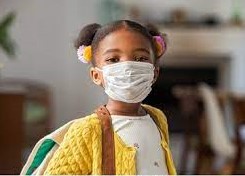Black PR Wire — In some heartening news on the COVID vaccine for kids front, two-thirds of American parents of children ages 5 to 11 plan to get their youngsters vaccinated when COVID-19 shots are approved for that age group, a new survey shows. However, more Black (49%) and Hispanic (47%) parents were “very worried” about their child contracting the virus than white parents (33%).
Nearly half (49%) of parents in the South were “very worried” about their child getting COVID-19, compared with 32% of those in the Northeast, and 30% of those in the Midwest and West.
Additionally, the region where the parents live played a major part in their hesitancy to get their child vaccinated.
Overall, 60% of the respondents supported schools requiring eligible children to get a vaccine to attend school in person.
Why the hesitancy?
Overall, 77% of parents were at least somewhat worried that their child could get COVID-19, but that varied depending on the parent’s vaccination status and the age of the child.
While 42% of vaccinated parents were “very worried” their child could get COVID-19, the rate was only 29% among unvaccinated parents.
About 42% of parents of children ages 5-11 were “very worried,” compared with 31% of parents of children ages 16-18.
The major reasons why unvaccinated parents of school-aged children said they haven’t been vaccinated are concern that the vaccines were developed too quickly (63%), worry about potential side effects (57%), and wanting to wait for more information (48%).
Those reasons are the same they gave for why they haven’t, or don’t plan to, have their child vaccinated.
Parents of unvaccinated children ages 12 to 18 said the major factors that might convince them to vaccinate their children include: school requirement (25%); full approval by the U.S. Food and Drug Administration (23%), or someone in their household at high risk (23%).
“While we’re encouraged to see that a majority of parents intend to vaccinate their children against COVID-19 once they are eligible, there is clearly more work to be done to help address parents’ questions and ease concerns about the vaccines,” Beth Battaglino, CEO of HealthyWomen and an organizer of the COVID-19 Vaccine Education and Equity Project, which conducted the survey says.
“Reaching people where they are, listening and working with trusted community voices to help instill confidence in the vaccine development, and [the] regulatory approval process is crucial to combat hesitancy and ensure that all families are equipped with the latest vaccine information to make an informed decision,” Battaglino concludes.







